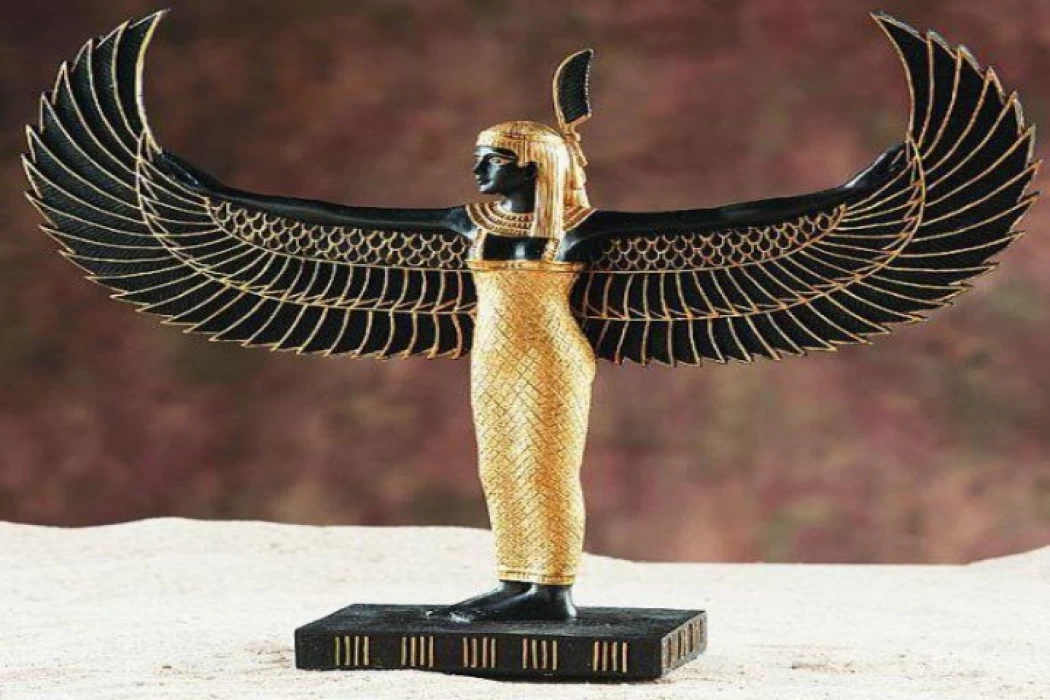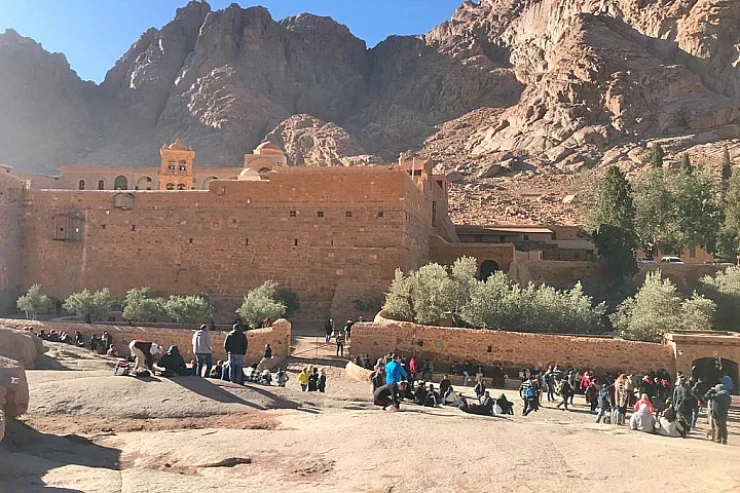
Facts about Ma`at Goddess in Ancient Egypt
The goddess Maat is also credited with controlling the seasons of the year and the movement of the stars, that's why Egypt was named in ancient times (the land of the Nile and MAAT).
the balance in the cuff and the feather of the goddess Maat in the other cuff. If the feather is weighted, he enters paradise in their beliefs, but if the heart is weighted, he goes to the courtyard, which the ancient Egyptian beliefs represented in the form of an imaginary predatory beast named amamut, whose head is the head of a crocodile, his body is the body of a lion and the back part of the body of a hippopotamus. The court of the other world consisted of 42 judges from the provinces of Egypt, headed by Osiris.
If the heart of the deceased is heavier than the "feather of truth" (Maat), this means that the deceased was a disobedient and lying mighty man in his life in this world doing evil deeds, then his heart is thrown and devoured by the mythical monster amamet, who is waiting by the balance, and this is his eternal end. The ancient Egyptians imagined about the day of judgment that Anubis would accompany the deceased to the courtroom, and the judges would begin to question the deceased about his actions in the world, and whether he was following the MAAT (the right way) or was one of the guilty. The deceased begins to defend himself and says: I did not kill anyone, I did not expose a human being, I did not complain to a worker to his boss, I did not steal.
The law
There are not many writings left that describe the practice of ancient Egyptian law. Maat represented the ordinary and fundamental values that formed the background of Justice, which must be carried out in the spirit of truth and fairness.
Thoth was the patron of the scribes, described as"he who reveals MAAT and calculates Maat; he loves MAAT and gives Maat to the doer of Maat". The urge to live according to Maat was emphasized so abundantly that this kind of educational text was called "Maat literature".
As a goddess
Maat, the goddess of harmony, justice, and truth, was represented as a young woman. Sometimes she is depicted with wings on each arm or as a woman with an ostrich feather on her head.
The sun god Ra placed his daughter Maat in the place of isfit (chaos). The Kings inherited the duty to ensure that Maat remained in place, and it was said that they (along with RA) "lived on Maat." Akhenaten (reigned from 1372 to 1355 BC) especially emphasized that concept to such a degree that the King's contemporaries considered it fanaticism. Some kings incorporated Maat into their names, and they were referred to by such names as Sayyid Maat, or Miri Maat (beloved Maat). Maat also had a pivotal role in the tradition of weighing the heart.
The negative confessions that one may make after death can be individual, that is, different from person to person. These are the confessions found in the Ani papyrus.
I didn't make a mistake. I didn't steal. I didn't loot. I didn't kill people. I didn't damage the food on offer. I did not steal God's property. I didn't lie. I didn't steal food. I wasn't frowning. I did not weigh with adulterers. I didn't make anyone cry. I was not hypocritical. I'm not used to. I didn't make a profit on pills. I didn't steal a piece of land. I didn't pass on the secrets. I did not file lawsuits. I didn't argue at all about the property. I have never had sex with a married woman. I have never had sex with a married woman. (He repeats the previous assertion, but it is addressed to another god). I did not have intercourse (unlike nature). I didn't cause horror. I have not violated the law. I was not sharp (- temper). I did not ignore sincere words. I didn't smell. I wasn't violent. I didn't change (the truth). I was not impatient. I didn't argue. I wasn't babbling about things. I have not done evil. I did not argue with the King. I didn't go into the water. My voice was not loud (he spoke arrogantly or angrily). I didn't curse a God. I wasn't showing off. I did not harm the food of the gods. I didn't steal the Blessed khanfu cakes from the deceased. I did not steal hanfu cakes from young people, and did not restrain the God of my city. I didn't kill the sacred cattle.
Temples
The oldest evidence of the existence of a temple dedicated to the cult of Maat dates back to the New Kingdom era (approximately 1569 to 1081 BC). Because of the great importance attached to Maat, Amenhotep III ordered the establishment of a temple to her in the Karnak complex, and textual evidence indicates the existence of other temples to Maat in MANF and Deir Medina. The MAAT temple in Karnak was also used as a meeting Court in connection with the robberies of the royal tombs during the reign of Ramses IX.
Ma`at Goddess in Ancient Egypt
Goddess Ma`at according to ancient Egyptian religion is a goddess of truth and justice, Ma`at is the daughter of Re god and wife to Thout god of knowledge Ma`at goddess represented in women form with ostrich feather above her head and holding the Ankh which means the life key and the other hand holding the mace
In the underworld of the ancient Egyptians, the heart of the dead were placed on the scales on one side and the feather of the goddess Maat on the other side. If the deceased’s heart tilted, he would enter Paradise in their beliefs, but if the feather swelled, he would enter Hell, which was represented by ancient Egyptian beliefs in the form of an imaginary predatory monster named Amamut, whose head is the head of a crocodile and his body is the body of a lion and its back is the body of a hippo. The court in the underworld consisted of 42 judges, the number of regions of Egypt, headed by Osiris.
The 42 Laws of Maat: Ancient Egyptian Society's Ethical Underpinnings The fundamental tenets of justice and morality in ancient Egypt were established by the 42 Laws of Maat.
The conception of the ancient Egyptians on Judgment Day was that Anubis would accompany the dead to the courtroom, and judges would begin to question the deceased about his actions in this world, and whether he was following the Maat (the right path) or was he among the sinners. And the deceased begins to defend himself and says: I did not kill anyone, I did not expose a person, and I did not complain about a worker with his boss, and I did not steal. I was feeding the poor, and I was given clothes to the naked, and I helped people, and I used to give the thirsty water. Then the judges began to ask him about his knowledge of the gods, so he had to mention the gods by their names and beware of forgetting one of them.
To the pharaohs, Ma'at was represented as a goddess with an ostrich feather on her head, a symbol of justice. The goddess held the key of life, Menkh, in one hand and a scepter in the other, symbolizing balance. She was credited with controlling the seasons and the movements of the planets and stars.
The Cult of Maat
While the cult of Maat was more than limited, the respect she commanded was, however, boundless. For maat (justice) was always a cornerstone of social balance. Respect among humankind, in particular, ensured a measure of salvation. A salvation that Maat would appreciate during the final judgment rendered by Osiris. "To speak according to Maat" meant to speak the truth. At the Last Judgment, the heart spoke according to Maat and could not lie. Upon death, no deceased could avoid the trial of the Last Judgment.
There, the weight of good and evil accumulated in each person's heart was calculated. Thus, the deceased who had lived with justice and kindness would be assured of having their heart compared to Maat, to their advantage. It was during psychostasis (the "weighing of the soul") that everything concerning their future in the afterlife was decided. Maat as a principle was created to meet the complex needs of the emerging Egyptian state, which embraced diverse peoples with conflicting interests. The development of such rules sought to avoid chaos, and Maat became the basis of Egyptian legislation.
The concept of "Maat" was the exact standard system for everything, which represents the basis of the world, and everything that corresponds to the purposes of the Creator deity. Hence, it is imperative for humans to preserve and approve them, and to restore "Maat" and the system to its proper condition if it is exposed to any defect or disorder.
And since the Egyptian view of the maat as the essence and material element upon which the whole world lives, and as a power for gods and for the living and the dead among humans, the "Coffins Texts" mentioned that gods live on (Maat), and the gods approved "Maat" on earth, and its approval was on The land is the responsibility of the king, who represents the gods among men, and lives like it on (Maat).















